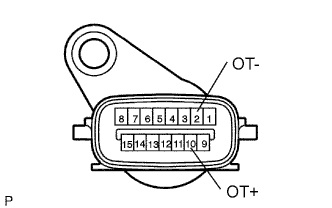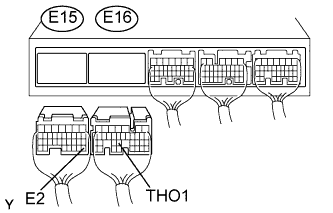Dtc P0710 Transmission Fluid Temperature Sensor A Circuit
DESCRIPTION
MONITOR DESCRIPTION
WIRING DIAGRAM
INSPECTION PROCEDURE
INSPECT TRANSMISSION WIRE (ATF TEMPERATURE SENSOR)
CHECK WIRE HARNESS (TRANSMISSION WIRE - ECM)
DTC P0710 Transmission Fluid Temperature Sensor "A" Circuit |
DTC P0712 Transmission Fluid Temperature Sensor "A" Circuit Low Input |
DTC P0713 Transmission Fluid Temperature Sensor "A" Circuit High Input |
DESCRIPTION
The Automatic Transmission Fluid (ATF) temperature sensor converts the ATF temperature into a resistance value which is input into the ECM.The ECM applies a voltage to the temperature sensor through ECM terminal THO1.The sensor resistance changes with the ATF temperature.One terminal of the sensor is grounded so that the sensor resistance and voltage decrease as the temperature becomes higher.The ECM calculates the ATF based on the voltage signal.DTC No.
| DTC Detection Condition
| Trouble Area
|
P0710
| No. 1 ATF temperature sensor resistance changes from (a) to (b) or from (b) to (a) in less than 0.5 sec., and P0712 and P0713 are not detected (1 trip detection logic):
(a) No. 1 ATF temperature sensor resistance is less than 79 Ω
(b) No. 1 ATF temperature sensor resistance is more than 156 kΩ
| - Open or short in No. 1 ATF temperature sensor circuit
- No. 1 ATF temperature sensor
- ECM
|
P0712
| No. 1 ATF temperature sensor resistance is less than 79 Ω for 0.5 sec. or more (1 trip detection logic)
| - Short in No. 1 ATF temperature sensor circuit
- No. 1 ATF temperature sensor
- ECM
|
P0713
| 15 minutes or more after the engine start, No. 1 ATF temperature sensor resistance is more than 156 kΩ for 0.5 sec. or more (1 trip detection logic)
| - Open in No. 1 ATF temperature sensor circuit
- No. 1 ATF temperature sensor
- ECM
|
MONITOR DESCRIPTION
ATF temperature sensor converts ATF temperature to an electrical resistance value. Based on the resistance, the ECM determines the ATF temperature, and the ECM detects an open or short in the ATF temperature circuit. If the resistance value of the ATF temperature is less than 79 Ω*1 or more than 156 kΩ*2, the ECM interprets this as a fault in the ATF sensor or wiring. The ECM will illuminate the MIL and store the DTC.- HINT:
- *1: 150°C (302°F) or more is indicated regardless of the actual ATF temperature.
- *2: -40°C (-40°F) is indicated regardless of the actual ATF temperature.
- The ATF temperature can be checked on the intelligent tester display.
WIRING DIAGRAM
INSPECTION PROCEDURE
- HINT:
- Using the intelligent tester's Data List allows switch, sensor, actuator and other item values to be read without removing any parts. Reading the Data List early in troubleshooting is one way to save time.
- Warm up the engine.
- Turn the ignition switch OFF.
- Connect the intelligent tester to the DLC3.
- Turn the ignition switch ON and push the tester main switch ON.
- Enter the following menus: Powertrain / Engine and ECT / Data List.
- Follow the instructions on the tester and read the Data List.
Item
| Measurement Item/
Range (Display)
| Normal Condition
| Diagnostic Note
|
A/T Oil Temperature 1
| No. 1 ATF temperature sensor value/
Min.: -40°C (-40°F)
Max.: 215°C (419°F)
| - After stall test:
Approximately 80°C (176°F)
- Equal to ambient temperature while engine is cold
| If value is -40°C (-40°F) or 150°C (302°F), No. 1 ATF temperature sensor circuit is open or short circuited
|
- CAUTION:
- In the table above, the values listed under "Normal Condition" are reference values. Do not depend solely on these reference values when deciding whether a part is faulty or not.
- HINT:
- When DTC P0712 is output and the intelligent tester output is 150°C (302°F) or more, there is a short circuit.
- When DTC P0713 is output and the intelligent tester output is -40°C (-40°F), there is an open circuit.
Measure the resistance between terminal THO1 (OT) and the body ground.
Temperature Displayed
| Malfunction
|
-40°C (-40°F)
| Open circuit
|
150°C (302°F) or more
| Short circuit
|
- HINT:
- If a circuit related to the ATF temperature sensor becomes open, P0713 is set in approximately 0.5 seconds.
- It is not necessary to inspect the circuit when P0711 is set.
| 1.INSPECT TRANSMISSION WIRE (ATF TEMPERATURE SENSOR) |
Disconnect the E1 ATF temperature sensor connector from the transmission.
Measure the resistance of the temperature sensor.
- Standard resistance:
Tester Connection
| Specified Condition
|
2 (OT-) - 10 (OT+)
| 79 Ω to 156 kΩ
|
2 (OT-) - Body ground
| 1 MΩ or higher
|
10 (OT+) - Body ground
| 1 MΩ or higher
|
- HINT:
- If the resistance is not within the specified range of either of the ATF temperatures shown in the table below, the driveability of the vehicle may decrease.
- Standard resistance:
ATF Temperature
| Specified Condition
|
20 °C (68°F)
| 3 to 4 kΩ
|
110°C (230°F)
| 0.22 to 0.28 kΩ
|
| | REPAIR OR REPLACE TRANSMISSION WIRE |
|
|
| 2.CHECK WIRE HARNESS (TRANSMISSION WIRE - ECM) |
Disconnect the E15 and E16 ECM connectors.
Measure the resistance of the wire harness side connectors.
- Standard resistance:
Tester Connection
| Specified Condition
|
E16-24 (THO1) - E15-28 (E2)
| 79 Ω to 156 kΩ
|
E16-24 (THO1) - Body ground
| 1 MΩ or higher
|
E15-28 (E2) - Body ground
| 1 MΩ or higher
|
| | REPAIR OR REPLACE HARNESS AND CONNECTOR |
|
|


